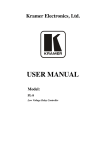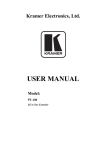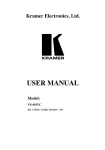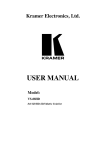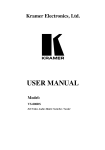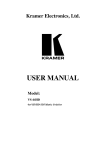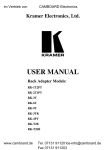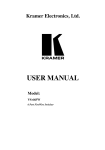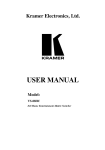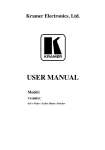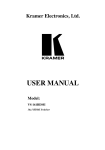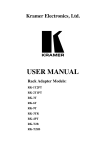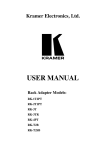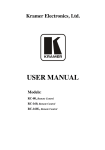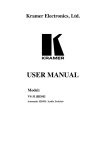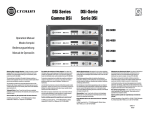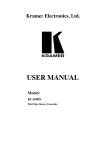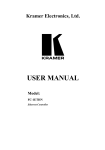Download VS-201YC Manual
Transcript
Kramer Electronics, Ltd. USER MANUAL Model: VS-201YC 2x1 s-Video Switcher Contents Contents 1 2 2.1 3 4 5 5.1 6 6.1 6.2 6.3 7 8 9 Introduction Getting Started Quick Start Overview Your VS-201YC 2x1 s-Video Switcher Connecting the VS-201YC 2x1 s-Video Switcher Connecting a PC Flash Memory Upgrade Downloading from the Internet Connecting the PC to the RS-232 Port Upgrading Firmware Technical Specifications Table of Hex Codes for Serial Communication VS-201YC Communication Protocol 1 1 1 3 4 6 7 8 8 8 9 13 14 14 Figures Figure 1: VS-201YC 2x1 s-Video Switcher Figure 2: VS-201YC 2x1 s-Video Switcher (Top Side Panel) Figure 3: VS-201YC 2x1 s-Video Switcher (Lower Side Panel) Figure 4: VS-201YC 2x1 s-Video Switcher Underside Figure 5: Connecting the VS-201YC 2x1 s-Video Switcher Figure 6: Connecting a PC without using a Null-modem Adapter Figure 7: Splash Screen Figure 8: Atmel – Flip Window Figure 9: Device Selection Window Figure 10: Selecting the Device from the Selection Window Figure 11: Loading the Hex Figure 12: RS-232 Window Figure 13: Atmel – Flip Window (Connected) Figure 14: Atmel – Flip Window (Operation Completed) 4 4 4 5 6 7 9 9 9 10 10 11 11 12 Tables Table 1: VS-201YC 2x1 s-Video Switcher Features Table 2: VS-201YC 2x1 s-Video Switcher Underside Features Table 3: VS-201YC 2x1 s-Video Switcher Technical Specifications Table 4: Hex Codes Table 5: Protocol Definitions Table 6: Instruction Codes for Protocol 2000 5 5 13 14 14 15 i Introduction 1 Introduction Welcome to Kramer Electronics (since 1981): a world of unique, creative and affordable solutions to the infinite range of problems that confront the video, audio and presentation professional on a daily basis. In recent years, we have redesigned and upgraded most of our line, making the best even better! Our 500-plus different models now appear in 8 Groups1, which are clearly defined by function. Congratulations on purchasing your Kramer VS-201YC 2x1 s-Video Switcher, which is ideal for the following applications: Presentation and display systems CCTV and home theater applications Rental and staging applications The package includes the following items: VS-201YC 2x1 s-Video Switcher Power adapter (12V DC Input) This user manual2 2 Getting Started We recommend that you: Unpack the equipment carefully and save the original box and packaging materials for possible future shipment Review the contents of this user manual Use Kramer high performance high resolution cables3 2.1 Quick Start This quick start chart summarizes the basic setup and operation steps. 1 GROUP 1: Distribution Amplifiers; GROUP 2: Video and Audio Switchers, Matrix Switchers and Controllers; GROUP 3: Video, Audio, VGA/XGA Processors; GROUP 4: Interfaces and Sync Processors; GROUP 5: Twisted Pair Interfaces; GROUP 6: Accessories and Rack Adapters; GROUP 7: Scan Converters and Scalers; and GROUP 8: Cables and Connectors 2 Download up-to-date Kramer user manuals from our Web site: http://www.kramerelectronics.com 3 The complete list of Kramer cables is on our Web site at http://www.kramerelectronics.com 1 Getting Started 2 KRAMER: SIMPLE CREATIVE TECHNOLOGY Overview 3 Overview The VS-201YC is a 2x1 switcher for s-Video signals that lets you switch either the signal at input 1 or input 2 to the output. In particular, the VS-201YC: Features video input and output signals on 4p connectors Has two selector buttons for selecting the input to route to the output To achieve the best performance: Connect only good quality connection cables, thus avoiding interference, deterioration in signal quality due to poor matching, and elevated noise levels (often associated with low quality cables) Avoid interference from neighboring electrical appliances that may adversely influence signal quality and position your Kramer VS-201YC away from moisture, excessive sunlight and dust Caution – No operator-serviceable parts inside unit. Warning – Use only the Kramer Electronics input power wall adapter that is provided with this unit1. Warning – Disconnect power and unplug unit from wall before installing or removing device or servicing unit. 1 For example: model number AD2512C, part number 2535-000251 3 Your VS-201YC 2x1 s-Video Switcher 4 Your VS-201YC 2x1 s-Video Switcher Figure 1, Figure 2, Figure 3 and Table 1 define the VS-201YC: Figure 1: VS-201YC 2x1 s-Video Switcher Figure 2: VS-201YC 2x1 s-Video Switcher (Top Side Panel) Figure 3: VS-201YC 2x1 s-Video Switcher (Lower Side Panel) 4 KRAMER: SIMPLE CREATIVE TECHNOLOGY Your VS-201YC 2x1 s-Video Switcher Table 1: VS-201YC 2x1 s-Video Switcher Features # 1 2 3 4 5 6 7 8 Feature 12VDC RS-232 DB 9F Port OUTPUT 4p Connector INPUT 2 4p Connector INPUT 1 4p Connector IN 1 SELECT Button IN 2 SELECT Button ON LED Function +12V DC connector for powering the unit 1 Connects to the PC or the Remote Controller Connect to the s-Video acceptor Connect to the s-Video source 2 Connect to the s-Video source 1 Press to select input 1 to switch to the output Press to select input 2 to switch to the output Illuminates when receiving power Figure 4 and Table 2 define the underside of the VS-201YC: Figure 4: VS-201YC 2x1 s-Video Switcher Underside Table 2: VS-201YC 2x1 s-Video Switcher Underside Features # 1 Feature Function PROGRAM Select OFF (by sliding to the left) for normal operation (the factory default), and ON Switch (by sliding to the right) to upgrade to the latest Kramer firmware (see section 6) 1 Via a null-modem connection 5 Connecting the VS-201YC 2x1 s-Video Switcher 5 Connecting the VS-201YC 2x1 s-Video Switcher To connect1 the VS-201YC 2x1 s-Video Switcher, as the example in Figure 5 illustrates, do the following: 1. Connect the two s-Video sources to the s-Video INPUT 4p connectors (for example, an s-Video player to INPUT 1 and an s-Video player to INPUT 2). 2. Connect the s-Video OUTPUT 4p connector to the acceptor (for example, an s-Video recorder). 3. If required, connect a PC to the RS-232 port2, see section 5.1. 4. Connect the 12V DC power adapter to the power socket2 and connect the adapter to the mains electricity. Figure 5: Connecting the VS-201YC 2x1 s-Video Switcher 1 Switch OFF the power on each device before connecting it to your VS-201YC. After connecting your VS-201YC, switch on its power and then switch on the power on each device 2 Not illustrated in Figure 5 6 KRAMER: SIMPLE CREATIVE TECHNOLOGY Connecting the VS-201YC 2x1 s-Video Switcher 5.1 Connecting a PC You can connect a PC to the VS-201YC via the RS-232 port. To connect using the Null-modem adapter provided with the machine (recommended method): Connect the RS-232 DB9 rear panel port on the VS-201YC to the Null-modem adapter and connect the Null-modem adapter with a 9-wire flat cable to the RS-232 DB9 port on your PC To connect without using a Null-modem adapter: Connect the RS-232 DB9 port on your PC to the RS-232 DB9 rear panel port on the VS-201YC, as Figure 6 illustrates PIN 5 Connected to PIN 5 (Ground) PIN 3 Connected to PIN 2 PIN 2 Connected to PIN 3 Female DB9 (From PC) Male DB9 PIN 4 Connected to PIN 6 PINS 8, 7, 1 Connected together If a Shielded cable is used, connect the shield to PIN 5 Figure 6: Connecting a PC without using a Null-modem Adapter 7 Flash Memory Upgrade 6 Flash Memory Upgrade The VS-201YC firmware is located in FLASH memory, which lets you upgrade1 to the latest Kramer firmware version in minutes! The process involves: Downloading from the Internet (see section 6.1) Connecting the PC to the RS-232 port (see section 6.2) Upgrading Firmware (see section 6.3) 6.1 Downloading from the Internet You can download the up-to-date file2 from the Internet. To do so: 1. Go to our Web site at http://www.kramerelectronics.com and download the file: “FLIP_VS201YC.zip” from the Technical Support section. 2. Extract the file: “FLIP_VS201YC.zip” to a folder (for example, C:\Program Files\Kramer Flash). 3. Create a shortcut on your desktop to the file: “FLIP.EXE”. 6.2 Connecting the PC to the RS-232 Port Before installing the latest Kramer firmware version on a VS-201YC unit, do the following: 1. Connect the RS-232 DB9 rear panel port on the VS-201YC unit to the Null-modem adapter and connect the Null-modem adapter with a 9-wire flat cable to the RS-232 DB9 COM port on your PC (see section 5.1). 2. On the underside panel, slide the PROGRAM switch to the right to ON. 3. Connect the power on the VS-201YC unit. 1 Upgrade should be carried out by skilled technical personnel. Failure to upgrade correctly will result in the malfunction of the machine 2 The files indicated in this section are given as an example only. These file names are liable to change from time to time 8 KRAMER: SIMPLE CREATIVE TECHNOLOGY Flash Memory Upgrade 6.3 Upgrading Firmware Follow these steps to upgrade the firmware: 1. Double click the desktop icon: “Shortcut to FLIP.EXE”. The Splash screen appears as follows: Figure 7: Splash Screen 2. After a few seconds, the Splash screen is replaced by the “Atmel – Flip” window: Figure 8: Atmel – Flip Window 3. Press the keyboard shortcut key F2 (or select the “Select” command from the Device menu, or press the integrated circuit icon in the upper right corner of the window). The “Device Selection” window appears: Figure 9: Device Selection Window 9 Flash Memory Upgrade 4. Click the button next to the name of the device and select from the list: AT89C51RD2: AT89C51RD2 T89C51RD2 Figure 10: Selecting the Device from the Selection Window 5. Click OK and select “Load Hex” from the File menu. A Figure 11: Loading the Hex 10 KRAMER: SIMPLE CREATIVE TECHNOLOGY Flash Memory Upgrade 6. The Open File window opens. Select the correct HEX file that contains the updated version of the firmware for VS-201YC (for example, 201YCM_V1p2.hex) and click Open. 7. Press the keyboard shortcut key F3 (or select the “Communication / RS232” command from the Settings menu, or press the keys: Alt SCR). The “RS232” window appears. Change the COM port according to the configuration of your computer and select the 9600 baud rate: Figure 12: RS-232 Window 8. Click Connect. In the “Atmel – Flip” window, in the Operations Flow column, the Run button is active, and the name of the chip appears as the name of the third column: AT89C51RD2. Verify that in the Buffer Information column, the “HEX File: VS201YC.hex” appears. A VS201YC.hex Figure 13: Atmel – Flip Window (Connected) 11 Flash Memory Upgrade 9. Click Run. After each stage of the operation is completed, the check-box for that stage becomes colored green1. When the operation is completed, all 4 check-boxes will be colored green and the status bar message: Memory Verify Pass appears2: A VS201YC.hex Figure 14: Atmel – Flip Window (Operation Completed) 10. Close the “Atmel – Flip” window. 11. Disconnect the power to the VS-201YC. 12. Disconnect the RS-232 rear panel port on the VS-201YC unit from the Null-modem adapter. 13. Switch to OFF on the machine underside. 14. Connect the power to the VS-201YC. 1 See also the blue progress indicator on the status bar 2 If an error message: “Not Finished” shows, click Run again 12 KRAMER: SIMPLE CREATIVE TECHNOLOGY Technical Specifications 7 Technical Specifications Table 3 includes the technical specifications1. Table 3: VS-201YC 2x1 s-Video Switcher Technical Specifications INPUTS: OUTPUT: MAX. OUTPUT LEVEL: BANDWIDTH (-3dB): DIFF. GAIN: DIFF. PHASE: K-FACTOR: S/N RATIO: CROSSTALK (all hostile): COUPLING: POWER SOURCE: DIMENSIONS: WEIGHT: ACCESSORIES: OPTIONS: 2 YC, 1Vpp/75 (Y), 0.3Vpp/75 (C) on 4p connectors 1 YC 1Vpp/75 (Y), 0.3Vpp/75 (C) on an 4p connector 2.4Vpp 520MHz 0.03% 0.02 Deg. <0.05% 78dB -53dB DC 12V, 110mA 12cm x 7.15cm x 2.76cm (4.7" x 2.8" x 1.08"), W, D, H 0.3 kg. (0.67 lbs.) approx. Power supply, mounting bracket Rack Adapter models: RK-1T2PT, RK-2T1PT, and/or RK-3T 1 Specifications are subject to change without notice 13 Table of Hex Codes for Serial Communication 8 Table of Hex Codes for Serial Communication Table 4 lists the Hex values for switching on the VS-201YC. Table 4: Hex Codes IN 1 IN 2 OUT 2 1 9 VS-201YC Communication Protocol The VS-201YC is compatible with Kramer’s Protocol 2000 (version 0.46) (below). This RS-232/RS-485 communication protocol uses four bytes of information as defined below. For RS-232, a null-modem connection between the machine and controller is used. The default data rate is 9600 baud, with no parity, 8 data bits and 1 stop bit. Table 5: Protocol Definitions MSB 0 7 LSB DESTINATION INSTRUCTION D 6 N5 5 N4 4 I6 6 I5 5 I4 4 O6 6 O5 5 O4 4 OVR 6 X 5 M4 4 N3 3 N2 2 N1 1 N0 0 I2 2 I1 1 I0 0 O2 2 O1 1 O0 0 M1 1 M0 0 1st byte 1 7 INPUT I3 3 2nd byte 1 7 OUTPUT O3 3 3rd byte 1 7 M3 3 MACHINE NUMBER M2 2 4th byte 1st BYTE: Bit 7 – Defined as 0. D – “DESTINATION”: 0 - for sending information to the switchers (from the PC); 1 - for sending to the PC (from the switcher). N5…N0 – “INSTRUCTION” The function that is to be performed by the switcher(s) is defined by the INSTRUCTION (6 bits). Similarly, if a function is performed via the machine’s keyboard, then these bits are set with the INSTRUCTION NO., which was performed. The instruction codes are defined according to the table below (INSTRUCTION NO. is the value to be set for N5…N0). 2nd BYTE: Bit 7 – Defined as 1. I6…I0 – “INPUT”. When switching (ie. instruction codes 1 and 2), the INPUT (7 bits) is set as the input number which is to be switched. Similarly, if switching is done via the machine’s front-panel, then these bits are set with the INPUT NUMBER which was switched. For other operations, these bits are defined according to the table. 3rd BYTE: 14 Bit 7 – Defined as 1. O6…O0 – “OUTPUT”. KRAMER: SIMPLE CREATIVE TECHNOLOGY VS-201YC Communication Protocol When switching (ie. instruction codes 1 and 2), the OUTPUT (7 bits) is set as the output number which is to be switched. Similarly, if switching is done via the machine’s front-panel, then these bits are set with the OUTPUT NUMBER which was switched. For other operations, these bits are defined according to the table. 4th BYTE: Bit 7 – Defined as 1. Bit 5 – Don’t care. OVR – Machine number override. M4…M0 – MACHINE NUMBER. Used to address machines in a system via their machine numbers. When several machines are controlled from a single serial port, they are usually configured together with each machine having an individual machine number. If the OVR bit is set, then all machine numbers will accept (implement) the command, and the addressed machine will reply. For a single machine controlled via the serial port, always set M4…M0 = 1, and make sure that the machine itself is configured as MACHINE NUMBER = 1. Table 6: Instruction Codes for Protocol 2000 Note: All values in the table are decimal, unless otherwise stated. # INSTRUCTION DESCRIPTION 0 1 RESET VIDEO SWITCH VIDEO 2 SWITCH AUDIO 3 STORE VIDEO STATUS RECALL VIDEO STATUS REQUEST STATUS OF A VIDEO OUTPUT REQUEST STATUS OF AN AUDIO OUTPUT VIS SOURCE 4 5 6 7 8 BREAKAWAY SETTING 9 VIDEO / AUDIO TYPE SETTING DEFINITION FOR SPECIFIC INSTRUCTION INPUT OUTPUT 0 Set equal to video input which is to be switched (0 = disconnect) Set equal to audio input which is to be switched (0 = disconnect) Set as SETUP # Set as SETUP # Set as SETUP # Set as SETUP # Set as input # when OUTPUT byte = 6; OR set as output # when OUTPUT byte = 7; OR set as blank period (in steps of 25ms) when OUTPUT byte = 32; OR set = 0. ***** 0 1 0 - for video 1 - for audio 2 - for VGA and DVI 0 Set equal to video output which is to be switched (0 = to all the outputs) Set equal to audio output which is to be switched (0 = to all the outputs) 0 - to store 1 - to delete 0 Equal to output number whose status is reqd Equal to output number whose status is reqd 0 - No VIS (immediate) 1 - Input # 1 2 - External digital sync 3 - External analog sync 4 - Dynamic sync 5 - Inter-machine sync 6 - Input # (INPUT byte) 7 - Output #(INPUT byte) 8 - User-defined sync 32 - RGBHV seamless switching 64 - Set for delayed switch 65 - Execute delayed switch 66 - Cancel delayed switch setting 0 - audio-follow-video 1 - audio breakaway 0 - FOLLOW mode 1 - Normal mode 0 - CV 4 - SDI 1 - YC 5 - CV+YC 2 - YUV 6 - VGA scaler 3 - RGBS 7 - DVI O0=0 – Unbalanced audio O0=1 – Balanced audio O1=0 – Digital audio O1=1 – Analog audio O4=0, O3=0, O2=0-Mono O4=0, O3=0,O2=1-Stereo 1 - 640X480 2 - 800X600 3 - 1024X768 NOTE 1 2, 15 2 2, 3, 15 2, 3, 15 4, 3 4, 3 2, 5, 17, 18 2 15 2 15 VS-201YC Communication Protocol # 10 REQUEST VIS SETTING 11 REQUEST BREAKAWAY SETTING REQUEST VIDEO / AUDIO TYPE SETTING SET HIGHEST MACHINE ADDRESS REQUEST HIGHEST MACHINE ADDRESS REQUEST WHETHER SETUP IS DEFINED / VALID INPUT IS DETECTED ERROR / BUSY 12 13 14 15 16 17 18 19 20 21 16 INSTRUCTION DESCRIPTION RESERVED RESET AUDIO STORE AUDIO STATUS RECALL AUDIO STATUS SET VIDEO PARAMETER DEFINITION FOR SPECIFIC INSTRUCTION INPUT OUTPUT Set as SETUP #, or set to 126 or 127 to request if machine has this function Set as SETUP #, or set to 126 or 127 to request if machine has this function Set as SETUP #, or set to 126 or 127 to request if machine has this function 0 - for video 1 - for audio 0 - for video 1 - for audio SETUP # or Input # For invalid / valid input (i.e. OUTPUT byte = 4 or OUTPUT byte = 5), this byte is set as the input # ---0 Set as SETUP # Set as SETUP # Equal to input / output number whose video parameter is to be set (0 = all) Equal to input / output number whose gain is to be set (0 = all) Equal to input / output number whose video parameter is to be increased / decreased (0 = all) 22 SET AUDIO PARAMETER 23 INCREASE / DECREASE VIDEO PARAMETER 24 INCREASE / DECREASE AUDIO PARAMETER Equal to input / output number whose parameter is to be increased / decreased (0 = all) 25 REQUEST AUDIO PARAMETER Equal to input / output number whose parameter is requested 26 REQUEST VIDEO PARAMETER Equal to input / output number whose video parameter is requested 0 - VIS source 1 - Input # or output # of source 2 - Vertical sync freq (Hz) 0 - Request audio breakaway setting 1 - Request “FOLLOW” setting 0 - for video 1 - for audio 2 - for VGA Set equal to highest machine address 0 0 - for checking if setup is defined 1 - for checking if input is valid 0 - error 1 - invalid instruction 2 - out of range 3 - machine busy 4 - invalid input 5 - valid input ---0 0 - to store 1 - to delete 0 NOTE 3, 4, 6, 7 3, 4, 6, 15 3, 4, 6 2 4 8 9, 25 10 1 2, 3 2, 3 Set as parameter value 2, 11, 24 Set as parameter value 2, 11, 24 0 - increase video gain 1 - decrease video gain 2 - increase contrast 3 - decrease contrast 4 - increase brightness 5 - decrease brightness 6 - increase color 7 - decrease color 8 - increase hue 9 - decrease hue 16 - increase H-phase 17 - decrease H-phase 18 - increase V-position 19 - decrease V-position 0 - increase output 1 - decrease output 2 - increase left output 3 - decrease left output 4 - increase right output 5 - decrease right output 6 - increase input 7 - decrease input 8 - increase left input 9 - decrease left input 10 - increase right input 11 - decrease right input 0 24 6, 24 0 6, 24 24 KRAMER: SIMPLE CREATIVE TECHNOLOGY VS-201YC Communication Protocol # INSTRUCTION DESCRIPTION 30 LOCK FRONT PANEL 31 REQUEST WHETHER PANEL IS LOCKED RESERVED 32 to 35 40 42 DIRECT MEMORY SAVE AUDIO PARAMETER SETTINGS FOR INSTRUCTIONS 22, 24, 25 DEFINITION FOR SPECIFIC INSTRUCTION INPUT OUTPUT 0 - Panel unlocked 1 - Panel locked 0 0 16 ---- ---- 10 Memory address Data 20 INPUT Bit: I0 - 0=input; 1=output I1 - Left I2 - Right 0 - Gain 1 - Bass 2 - Treble 3 - Midrange 24 0 - video gain 1 - contrast 2 - brightness 3 - colour 4 - hue 5 - H-phase 6 - V-position 1 - SVS protocol 2 - Generic protocol 0 24 43 VIDEO PARAMETER SETTINGS FOR INSTRUCTIONS 21, 23, 26 1 – Input 2 – Output 56 CHANGE TO ASCII 0 57 SET AUTO-SAVE 58 59 EXECUTE LOADED DATA LOAD VIDEO DATA I3 - no save I4 - auto-save Set as 0, or as SETUP #. 60 LOAD AUDIO DATA 61 IDENTIFY MACHINE 62 DEFINE MACHINE 63 EXTENDED DATA NOTES on the above table: Set equal to video input (0 = disconnect) 0 NOTE 1-Take 2-Cancel Set equal to video output (0 = to all the outputs) (127 = load SETUP #) or SETUP # Set equal to audio input (0 = disconnect) Set equal to audio output (0 = to all the outputs) (127 = load SETUP #) 1 - video machine name 2 - audio machine name 3 - video software version 4 - audio software version 5 - RS422 controller name 6 - RS422 controller version 7 - remote control name 8 - remote software version 9 - Protocol 2000 revision 1 - number of inputs 2 - number of outputs 3 - number of setups or SETUP # 0 - Request first 4 digits 1 - Request first suffix 2 - Request second suffix 3 - Request third suffix 10 - Request first prefix 11 - Request second prefix 12 - Request third prefix 7 MSBs for INPUT data 1 - for video 2 - for audio 3 - for SDI 4 - for remote panel 5 - for RS-422 controller 7 MSBs for OUTPUT data 2 19 12, 2 22, 3 22, 23 22, 23 13 14 20 NOTE 1 - When the master switcher is reset, (e.g. when it is turned on), the reset code is sent to the PC. If this code is sent to the switchers, it will reset according to the present power-down settings. NOTE 2 - These are bi-directional definitions. That is, if the switcher receives the code, it will perform the instruction; and if the instruction is performed (due to a keystroke operation on the front panel), then these codes are sent. For example, if the HEX code 01 85 88 83 was sent from the PC, then the switcher (machine 3) will switch input 5 to output 8. If the user switched input 1 to output 7 via the front panel keypad, then the switcher will send HEX codes: 41 81 87 83 to the PC. When the PC sends one of the commands in this group to the switcher, then, if the instruction is valid, the switcher replies by sending to the PC the same four bytes that it was sent (except for the first byte, where the DESTINATION bit is set high). NOTE 3 - SETUP # 0 is the present setting. SETUP # 1 and higher are the settings saved in the switcher' s memory, (i.e. those used for Store and Recall). 17 VS-201YC Communication Protocol NOTE 4 - The reply to a "REQUEST" instruction is as follows: the same instruction and INPUT codes as were sent are returned, and the OUTPUT is assigned the value of the requested parameter. The replies to instructions 10 and 11 are as per the definitions in instructions 7 and 8 respectively. For example, if the present status of machine number 5 is breakaway setting, then the reply to the HEX code 0B 80 80 85 would be HEX codes 4B 80 81 85 NOTE 5 – For the OUTPUT byte set as 6, the VIS source is the input selected using the OUTPUT byte. Similarly, for the OUTPUT byte set as 7, the VIS source is the output selected using the OUTPUT byte. Note also, that on some machines the sync source is not software selectable, but is selected using switches, jumpers, etc! NOTE 6 – If INPUT is set to 127 for these instructions, then, if the function is defined on this machine, it replies with OUTPUT=1. If the function is not defined, then the machine replies with OUTPUT=0, or with an error (invalid instruction code). If the INPUT is set to 126 for these instructions, then, if possible, the machine will return the current setting of this function, even for the case that the function is not defined. For example, for a video switcher which always switches during the VIS of input #1, (and its VIS setting cannot be programmed otherwise), the reply to the HEX code 0A FE 80 81 (ie. request VIS setting, with INPUT set as 126dec) would be HEX codes 4A FE 81 81 (ie. VIS setting = 1, which is defined as VIS from input #1). NOTE 7 – Setting OUTPUT to 0 will return the VIS source setting as defined in instruction #7. Setting to 1 will return the input # or output # of the sync source (for the case where the VIS source is set as 6 or as 7 in instruction #7). Setting to 2 returns the vertical sync frequency (0 for no input sync, 50 for PAL, 60 for NTSC, 127 for error). NOTE 8 - The reply is as in TYPE 3 above, except that here the OUTPUT is assigned with the value 0 if the setup is not defined / no valid input is detected; or 1 if it is defined / valid input is detected. NOTE 9 - An error code is returned to the PC if an invalid instruction code was sent to the switcher, or if a parameter associated with the instruction is out of range (e.g. trying to save to a setup greater than the highest one, or trying to switch an input or output greater than the highest one defined). This code is also returned to the PC if an RS-232 instruction is sent while the machine is being programmed via the front panel. Reception of this code by the switcher is not valid. NOTE 10 – This code is reserved for internal use. NOTE 11 – For machines where the video and / or audio gain is programmable. NOTE 12 - Under normal conditions, the machine' s present status is saved each time a change is made. The "power-down" save (auto-save) may be disabled using this code. Note that whenever the machine is turned on, the auto-save function is set. NOTE 13 - This is a request to identify the switcher/s in the system. If the OUTPUT is set as 0, and the INPUT is set as 1, 2, 5 or 7, the machine will send its name. The reply is the decimal value of the INPUT and OUTPUT. For example, for a 2216, the reply to the request to send the audio machine name would be (HEX codes): 7D 96 90 81 (i.e. 128dec+ 22dec for 2nd byte, and 128dec+ 16dec for 3rd byte). If the request for identification is sent with the INPUT set as 3 or 4, the appropriate machine will send its software version number. Again, the reply would be the decimal value of the INPUT and OUTPUT - the INPUT representing the number in front of the decimal point, and the OUTPUT representing the number after it. For example, for version 3.5, the reply to the request to send the version number would be (HEX codes): 7D 83 85 81 (i.e. 128dec+ 3dec for 2nd byte, 128dec+ 5dec for 3rd byte). If the OUTPUT is set as 1, then the ASCII coding of the lettering following the machine’s name is sent. For example, for the VS-7588YC, the reply to the request to send the first suffix would be (HEX codes): 7D D9 C3 81 (i.e. 128dec+ ASCII for “Y”; 128dec+ ASCII for “C”). NOTE 14 - The number of inputs and outputs refers to the specific machine which is being addressed, not to the system. For example, if six 16X16 matrices are configured to make a 48X32 system (48 inputs, 32 outputs), the reply to the HEX code 3E 82 81 82 (ie. request the number of outputs) would be HEX codes 7E 82 90 82 ie. 16 outputs NOTE 15 – When the OVR bit (4th byte) is set, then the “video” commands have universal meaning. For example, instruction 1 (SWITCH VIDEO) will cause all units (including audio, data, etc.) to switch. Similarly, if a machine is in “FOLLOW” mode, it will perform any “video” instruction. 18 KRAMER: SIMPLE CREATIVE TECHNOLOGY VS-201YC Communication Protocol NOTE 16 - The reply to the “REQUEST WHETHER PANEL IS LOCKED” is as in NOTE 4 above, except that here the OUTPUT is assigned with the value 0 if the panel is unlocked, or 1 if it is locked. NOTE 17 – For clean switching of RGBHV video, the “seamless switching” option may be used. The blanking period for the transition of the RGB sources may be set in this case, in steps of 25 milliseconds. For example, to set for 350ms blanking time (14 steps), send HEX codes 07 8E A0 81 NOTE 18 – Delayed execution allows switching after a delay dictated by RS-232. To do this, the user sends instruction 7 with the “Set for delayed switch” option (64dec) before sending the switch command (instruction 1) or pressing via front panel. The switch is not executed (unless timed-out) until the “Execute delayed switch” code is sent, or the “Set for delayed switch” code is sent again. (The mode is automatically cancelled after implementation of the switch if the “execute” command is used). For example, to connect input 4 to output 3 after a delay, send HEX codes 07 80 C0 81 (set for delayed switch) 01 84 83 81 (switch code) then, after the required delay, send HEX codes 07 80 C1 81 (execute delayed switch) to implement the switch. NOTE 19 – After this instruction is sent, the unit will respond to the ASCII command set defined by the OUTPUT byte. The ASCII command to operate with the HEX command set must be sent in order to return to working with HEX codes. NOTE 20 – When data (ie. the INPUT and/or OUTPUT bytes) of more than 7 bits is required, this instruction is sent before sending the instruction needing the additional bits. The data in this intruction then becomes the Most Significant Bits of that next instruction. For example, to set the audio gain (instruction 22) of output 3 to 681dec (2A9hex), you would first send HEX codes 3F 80 85 81 and then send HEX codes 16 83 A9 81. To set the audio gain of output 6 to 10013dec (271Dhex), first send HEX codes 3F 80 CE 81 followed by HEX codes 16 86 9D 81. NOTE 21 – To store data in the non-volatile memory of the unit, eg. the EEPROM for saving SETUPS. The EEPROM address is sent using the INPUT byte, and the data to be stored is sent using the OUTPUT byte. To use this instruction, it is necessary to understand the memory map, and memory structure of the particular machine. NOTE 22 – Instruction 59 and instruction 60 load data for sending to the crosspoint switcher (or for storing in a SETUP), ie. the data is “lined-up” to be executed later. Instruction 58 executes the loaded data. NOTE 23 – If the INPUT byte is set as 127dec, then the data stored in a SETUP is loaded. The SETUP # is in the OUTPUT byte. NOTE 24 – Further information needed in instructions 21, 22, 25 and 26, is sent using instruction 42 – which is sent prior to the instruction. For example, to request the audio gain value of right input # 9, send hex codes 2A 84 80 81 and then send HEX codes 19 89 81 81. NOTE 25 – For units which detect the validity of the video inputs, Instruction 16 will be sent whenever the unit detects a change in the state of an input (in real-time). For example, if input 3 is detected as invalid, the unit will send the HEX codes 10 83 84 81 If input 7 is detected as valid, then the unit will send HEX codes 10 87 85 81. 19 20 KRAMER: SIMPLE CREATIVE TECHNOLOGY For the latest information on our products and a list of Kramer distributors, visit our Web site: www.kramerelectronics.com, where updates to this user manual may be found. We welcome your questions, comments and feedback. Safety Warning: Disconnect the unit from the power supply before opening/servicing. Caution Kramer Electronics, Ltd. Web site: www.kramerelectronics.com E-mail: [email protected] P/N: 2900–000267 REV 1


























